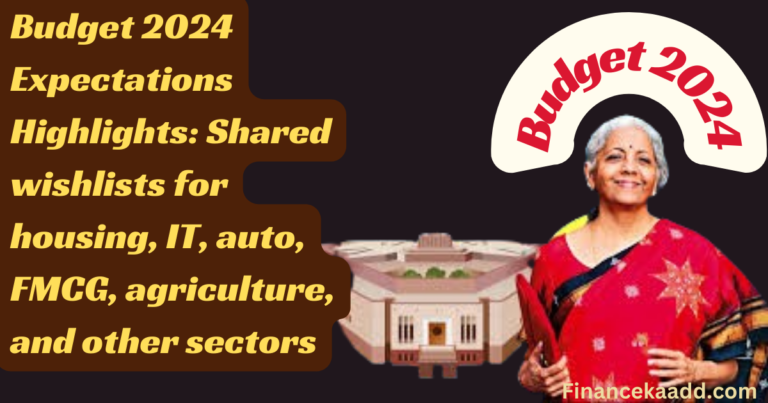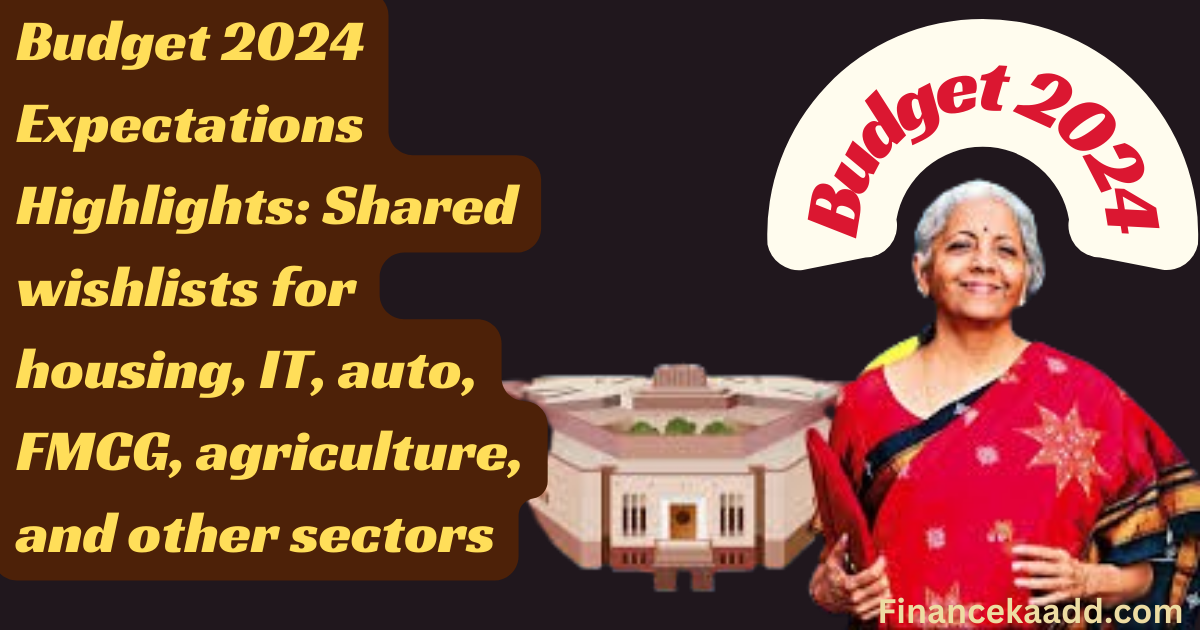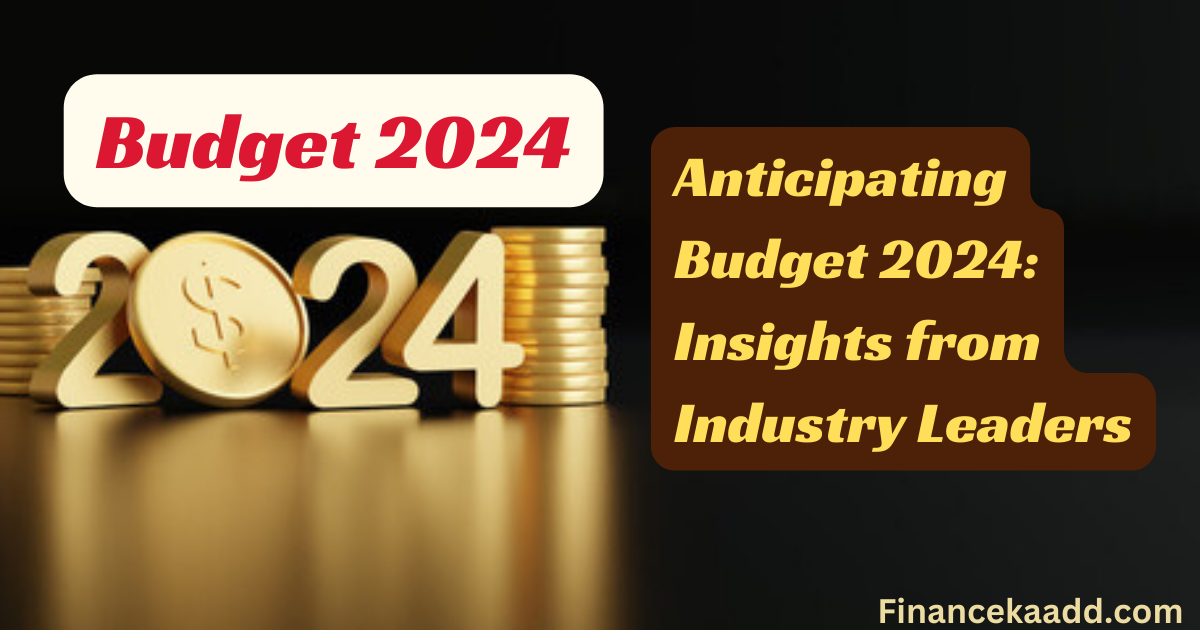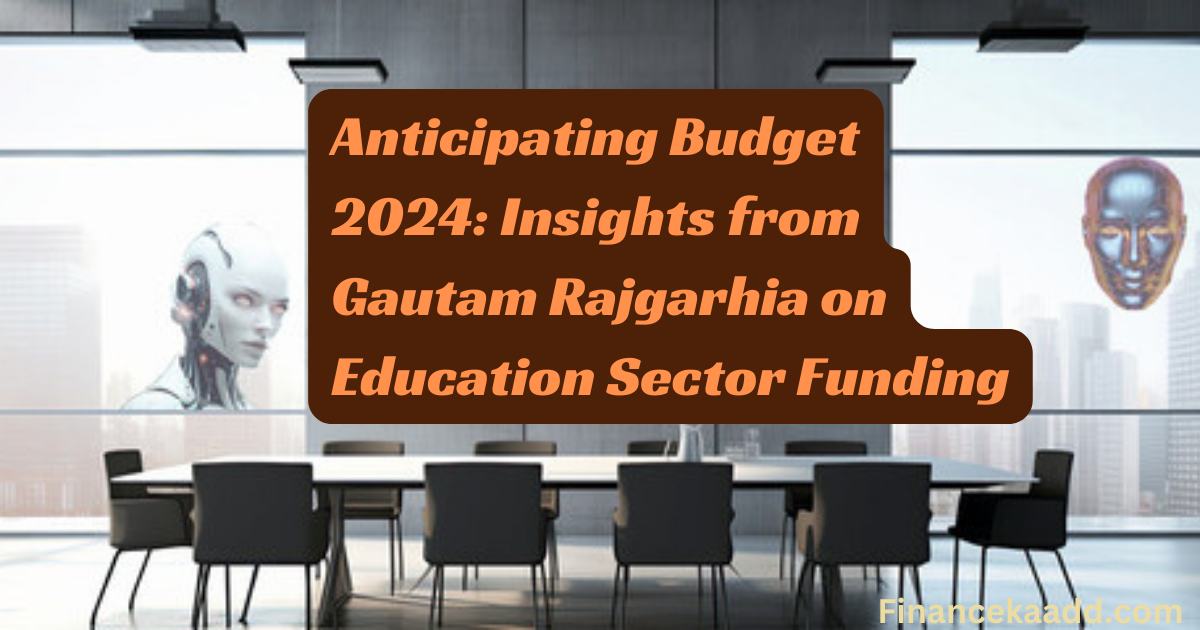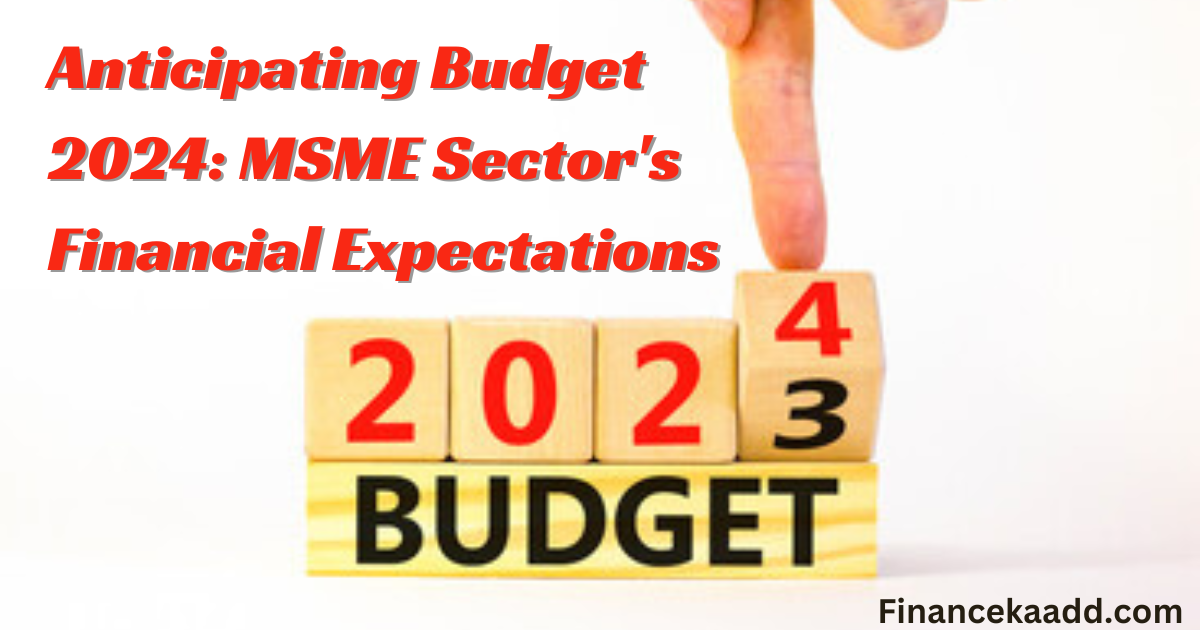Agriculture Sector: Cultivating Growth and Sustainability
In the realm of agriculture, stakeholders anticipate allocations and policies aimed at fostering growth, sustainability, and resilience. From subsidies for farmers to investments in irrigation infrastructure and technology adoption, the budget is expected to address the evolving needs of this vital sector.
Infrastructure Development: Paving the Way for Progress
Infrastructure development remains a cornerstone of economic growth. Expectations run high for budgetary provisions that prioritize the expansion and modernization of transportation networks, urban infrastructure, and renewable energy projects, laying the groundwork for a more connected and resilient India.
Healthcare: Nurturing Well-being and Access
Amidst the ongoing healthcare challenges, stakeholders look to the budget for initiatives aimed at strengthening the healthcare system, enhancing access to quality care, and bolstering public health infrastructure. Investments in medical research, disease prevention, and healthcare delivery are anticipated to feature prominently.
Education: Empowering the Next Generation
Education is paramount to India’s future, and stakeholders await budgetary measures to enhance accessibility, quality, and innovation in the education sector. From investments in digital learning infrastructure to skill development initiatives, the budget is poised to shape the educational landscape for generations to come.
Finance and Manufacturing: Fueling Economic Momentum
The finance and manufacturing sectors are integral to India’s economic engine. Expectations are high for policies that promote investment, innovation, and competitiveness, driving productivity and job creation. Measures to streamline regulations, facilitate ease of doing business, and incentivize domestic manufacturing are eagerly awaited.
Logistics: Navigating Toward Efficiency and Resilience
In the dynamic realm of logistics, stakeholders anticipate budget allocations geared towards enhancing efficiency, sustainability, and resilience. Investments in infrastructure, technology adoption, and eco-friendly practices are expected to optimize supply chain operations and mitigate risks posed by disruptions, fostering a more agile and robust logistics ecosystem.
Conclusion: A Blueprint for Progress
As anticipation mounts for Budget 2024, stakeholders across diverse sectors articulate their expectations and aspirations for a fiscal plan that fosters growth, innovation, and societal well-being. Beyond mere numbers, the budget represents a strategic roadmap, guiding India towards a future characterized by prosperity, inclusivity, and resilience.
Anticipating Union Budget 2024: Insights from Industry Leader Sachin Sharma
Vision for Sustainable Growth
Sachin Sharma, Founder and Director of Gem Enviro Management Limited, shares his perspective on the expectations from Union Budget 2024, particularly focusing on sustainable development and waste management initiatives.
Building on Past Initiatives
Reflecting on previous budgetary allocations, Sharma acknowledges the government’s strategic emphasis on ‘green growth’ within the overarching ‘Saptarishi’ framework. Notably, significant funding of ₹35,000 crore was earmarked for priority capital investment aimed at achieving net zero emissions by 2070. Despite these commendable efforts, challenges persist in streamlining waste management processes, particularly in addressing plastic waste.
Addressing GST Concerns
In anticipation of Budget 2024, industry stakeholders, including Sharma, express optimism regarding a potential revision in the GST rate on plastic input material. Sharma advocates for a reduction from the current 18% to the previous rate of 5%, which could stimulate investment and innovation in the plastic recycling sector.
Aligning with Global Commitments
Sharma underscores India’s commitment to sustainable growth, citing the prominence of climate action on the G20 agenda and initiatives like the Green Credit Initiative at COP28. He emphasizes the need for increased support for the plastic and e-waste recycling industries, aligning with international standards, and advancing India’s position as a leader in sustainable waste management practices.
The Imperative for Immediate Action
Highlighting the urgency of the waste crisis, Sharma calls for targeted measures in Budget 2024 to strengthen the waste management ecosystem. Suggestions include allocating funds for advanced waste-to-energy plants, enhancing infrastructure, optimizing supply chains, and incentivizing businesses to adopt sustainable practices. These interventions, Sharma argues, are crucial for addressing environmental concerns and fostering a greener, more sustainable India.
AU BANK SAVINGS ACCOUNT 👉CLICK HERE
Conclusion: A Call to Action
As the nation awaits Budget 2024, Sachin Sharma’s insights underscore the critical importance of prioritizing sustainable development and waste management initiatives. With strategic interventions and targeted investments, Budget 2024 has the potential to accelerate India’s transition towards a cleaner, more resilient future, aligning with both national priorities and global sustainability goals.
Anticipating Budget 2024: Insights from Industry Leaders
Enhancing Logistics Infrastructure: Abhishek Chakraborty’s Perspective
Abhishek Chakraborty, Executive Director of DTDC Express, sheds light on the government’s focus on bolstering logistics and supply chain infrastructure. He anticipates Budget 2024 to further expand on this vision, emphasizing the need for strategic reforms and allocations. Chakraborty calls for the establishment of a comprehensive logistics network spanning air, roads, ports, and railways to foster a dynamic and responsive supply chain. He highlights the importance of leveraging advanced technologies like artificial intelligence, machine learning, IoT, and blockchain to enhance operational efficiencies and unlock greater value in the logistics sector.
Addressing Rising Costs in Infrastructure Development: Aparna Reddy’s Insights
Aparna Reddy, Executive Director of AEL, discusses the challenges posed by rising raw material costs in infrastructure projects and the real estate sector. Despite heavy investments in infrastructure, increasing prices of materials such as cement, concrete, and steel are impeding progress. Reddy stresses the need for strategic measures to mitigate these costs, suggesting a reduction in GST charges on essential materials like steel, cement, and aluminium.
Additionally, she advocates for bringing petroleum products such as natural gas and diesel under the GST regime to alleviate financial burdens on developers and contractors. Reducing these charges, coupled with encouraging domestic production of building materials, can bolster the self-reliance agenda and stimulate consumer demand in the real estate segment. Reddy also emphasizes the importance of investing in research and development of eco-friendly construction materials and incentivizing companies that adhere to sustainable norms. These initiatives, she argues, will drive innovation, promote environmental sustainability, and ensure a stable supply chain for the industry.
Conclusion: A Call for Strategic Interventions
As Budget 2024 approaches, insights from industry leaders like Chakraborty and Reddy underscore the critical need for strategic interventions to address key challenges and capitalize on opportunities in the logistics infrastructure and construction sectors. By prioritizing reforms, allocations, and technological advancements, Budget 2024 has the potential to propel India towards a more resilient, sustainable, and prosperous future.
Anticipating Budget 2024: Expectations from the Fintech and Digital Lending Industry
A Call for Regulatory Clarity and Support
As Budget 2024 approaches, the fintech and digital lending industries articulate two key expectations from the government.
1. Regulatory Framework for Legal Recognition and Supervision
The industry seeks a clear regulatory framework that provides legal recognition, licensing, and supervision. This framework is essential for establishing a level playing field with traditional lenders, fostering trust among customers and investors, and ensuring compliance with regulatory standards. By delineating clear guidelines and oversight mechanisms, the government can enhance transparency, accountability, and stability within the fintech and digital lending ecosystems.
2. Favorable Tax Framework for Startups
In addition to regulatory clarity, the industry anticipates a favourable tax framework tailored for startups. This framework should include incentives and exemptions aimed at lowering capital costs and enhancing profitability for fintech and digital lending ventures. By reducing tax burdens and providing financial incentives, the government can stimulate innovation, attract investment, and promote entrepreneurship in the fintech sector. These measures are crucial for fostering a conducive environment for growth, innovation, and competitiveness within the industry.
Conclusion: Driving Growth and Innovation
As Budget 2024 unfolds, the fintech and digital lending industries look to the government to address their key expectations. By providing regulatory clarity and support, as well as implementing a favourable tax framework, the government can empower startups, promote financial inclusion, and catalyze economic growth. These strategic interventions will not only benefit the fintech ecosystem but also contribute to India’s journey towards becoming a global hub for innovation and digital finance.
Anticipating Budget 2024: Insights from Gautam Rajgarhia on Education Sector Funding
Urgent Call for Increased Education Allocation
Gautam Rajgarhia, Pro-Vice Chairman of DPS, highlights a pressing expectation from the Union Budget: a substantial increase in education allocation. Currently, India allocates approximately 3% of its GDP to education, a figure that lags behind many other nations. With a staggering 250 million students enrolled in K–12 education, the need for enhanced budgetary provisions becomes increasingly evident.
Bridging the Gap: Aligning with National Education Policy Targets
Rajgarhia underscores that current education spending falls significantly short of the ambitious target set by the National Education Policy, which advocates allocating 6% of the GDP to education. Bridging this gap is imperative to address the diverse needs of India’s educational landscape and ensure equitable access to quality education for all.
Conclusion: Prioritizing Educational Investment
As Budget 2024 approaches, Gautam Rajgarhia’s insights shed light on the critical need for increased allocation to the education sector. By prioritizing educational investment and aligning with the targets set forth by the National Education Policy, the government can pave the way for transformative change, empower the nation’s youth, and propel India towards a brighter, more inclusive future.
Anticipating Budget 2024: Insights from Industry Leaders
Stimulating the Real Estate Sector: Atul Monga’s Perspective
Atul Monga, CEO and co-founder of Basic Home Loan, shares insights on expectations for the real estate sector in Budget 2024. Monga suggests specific measures to invigorate the sector:
- Revaluation of Affordable Housing Criteria: Monga proposes adjusting price limits to ₹70–75 lakh for metro cities, thereby broadening accessibility to affordable housing.
- Release of Government-Owned Land: He advocates for releasing government-owned land for affordable housing, addressing shortages, and lowering overall real estate prices.
- Implementation of Interest Subvention Scheme: Monga recommends implementing an interest subvention scheme for urban housing, providing substantial interest subsidies on loans up to ₹50 lakh. This initiative aims to boost home loan demand, particularly for lower-income urban homebuyers, revitalizing the housing market.
India’s Export Targets: Outlook and Challenges
Reflecting on India’s ambitious export targets, Monga acknowledges the government’s goal of exporting goods and services worth $2 trillion by 2030. Despite this vision, challenges persist in the export landscape:
- Declining Merchandise Exports: Monga notes a decline of 5.5 percent year-on-year in India’s overall merchandise exports till October ’23.
- High Tariffs and Trade Agreements: He highlights India’s high average MFN tariff of 9.7 percent and the relative absence of FTAs compared to countries like Vietnam, which diminishes the competitiveness of Indian exports in international markets.
Expectations for Budget 2024
Considering the upcoming budget, Monga anticipates measures to address these challenges and foster competitiveness in the export sector:
- Reductions in Import Duties: Given the government’s focus on exports, Monga expects reductions in import duties to enhance competitiveness and enable Indian industries to thrive globally.
- Interim Budget Outlook: While Budget 2024 is expected to be an interim budget before general elections, Monga believes that reductions in import duties remain within the government’s ambit, aligning with its emphasis on export promotion.
Conclusion: Navigating Challenges, Embracing Opportunities
As Budget 2024 approaches, insights from Atul Monga shed light on the expectations and challenges facing the real estate and export sectors. By implementing targeted measures to stimulate housing demand and enhance export competitiveness, the government can navigate challenges, unlock growth opportunities, and propel India towards achieving its economic aspirations.
Anticipating Budget 2024: Perspectives from Industry Leaders
Prioritizing MSME Sector: Rohit Arora’s Insights
Rohit Arora, CEO and co-founder of Biz2X and Biz2Credit, outlines expectations for the MSME sector in Budget 2024. Arora emphasizes the importance of financial inclusion and ease of doing business in fostering a conducive environment for growth. He advocates for the following measures:
- Simplified Regulatory Procedures: Arora calls for streamlined regulatory procedures to reduce bureaucratic hurdles and enhance operational efficiency for startups and MSMEs.
- Reduced Compliance Burdens: He stresses the need for reducing compliance burdens, enabling MSMEs to allocate resources more effectively and focus on business expansion and innovation. These measures, Arora believes, will promote agility and competitiveness within the MSME landscape, driving economic growth and job creation.
Addressing Inflation Concerns: Hemant Sood’s Perspective
Hemant Sood, MD of Findoc, shares insights on the importance of controlling inflation in Budget 2024. With India’s G20 presidency and aspirations to become the 5th largest economy, maintaining fiscal stability is paramount. Sood advocates for policies and measures that prioritize internal growth, investments, and job creation while addressing inflation concerns and keeping the deficit in check. He suggests:
- Balancing Tax Revenue and Spending: Sood emphasizes the delicate balance between tax revenue and increased spending on infrastructure and social welfare programs. Effective fiscal management is essential to stimulating economic growth while controlling inflationary pressures.
- Creating Job Opportunities: He highlights the importance of strengthening youth by creating more job opportunities, aligning with broader efforts to enhance human capital and workforce productivity.
- Controlling Inflation: Sood calls for corrective measures to control inflation, ensuring price stability and safeguarding the purchasing power of consumers. By implementing prudent monetary and fiscal policies, the government can mitigate inflationary risks and sustain economic growth.
Conclusion: Navigating Economic Priorities
As Budget 2024 approaches, insights from Rohit Arora and Hemant Sood underscore the importance of addressing diverse economic priorities. By prioritizing financial inclusion, ease of doing business, and inflation control, the government can foster a conducive environment for MSME growth, job creation, and sustainable economic development. Strategic fiscal management and policy interventions will be crucial in navigating the complexities of India’s economic landscape and realizing its aspirations for prosperity and stability.
Anticipating Budget 2024: Perspectives from Industry Leaders
Advancing Crypto Sector: Manhar Garegrat’s Insights
Manhar Garegrat, Country Head of India and Global Partnerships at Liminal Custody Solutions, shares expectations for the crypto sector in Budget 2024. Garegrat highlights the potential of tokenization of real-world assets (RWAs), estimating it as a $10 trillion opportunity. He emphasizes the urgent need for investment and innovation in tokenized RWAs and urges the government to adopt progressive policies to nurture this segment. Specifically, Garegrat calls for amending the definition of virtual digital assets (VDA) to explicitly exclude tokenized assets with proven underlying value, aligning with established precedents like gift card exemptions.
Fostering IT Sector Growth: Shashank Srivastava’s Perspective
Shashank Srivastava, Senior Vice President of Forsight.ai, outlines expectations for the IT sector in Budget 2024. He underscores the importance of sustained policy support and strategic investments in emerging technologies to ensure the continued rapid growth of India’s tech sector. Srivastava suggests several key measures:
- Extended Tax Holidays for Startups: He advocates for extended tax holidays for startups to incentivize entrepreneurship and innovation.
- Incentives for R&D in Emerging Technologies: Srivastava calls for further incentives for investments in R&D, particularly in artificial intelligence (AI) and other deep technologies.
- Preferential Market Access Policies: He recommends preferential market access policies to encourage the procurement of innovative solutions from local startups by both the public and private sectors.
- Skilling Programs and Higher Education Partnerships: Srivastava emphasizes the importance of skilling programs and higher education partnerships focused on digital skills to build India’s talent base in AI and data science.
- Digital Infrastructure Development: He highlights the necessity of building advanced digital infrastructure across urban and rural areas to ensure widespread access to emerging technologies.
Conclusion: Nurturing Innovation and Growth
As Budget 2024 approaches, insights from Manhar Garegrat and Shashank Srivastava underscore the importance of fostering innovation and growth across the crypto and IT sectors. By adopting progressive policies, incentivizing investments in R&D, and prioritizing skills development and digital infrastructure, the government can position India as a global leader in both digital asset technologies and cutting-edge IT solutions. These strategic interventions will not only drive economic growth but also unlock solutions to societal challenges, propelling India towards a digital-first future.
Anticipating Budget 2024: Insights from Jitesh Dodiya on the EV Sector and Startup Expectations
Accelerating Electric Mobility: Addressing Infrastructure Needs
Jitesh Dodiya, founder and CEO of Griden Power, discusses expectations for the electric vehicle (EV) sector and startups in Budget 2024. Dodiya highlights the transformative potential of the government’s FAME scheme in accelerating the adoption of EVs in India, particularly emphasizing the importance of robust charging infrastructure to alleviate range anxiety. As the interim budget approaches, Dodiya expects substantial incentives and support for the development of charging infrastructure. He stresses the significance of a well-connected and accessible charging network in realizing the goals of the FAME scheme and advancing the nation’s vision of a sustainable transportation ecosystem.
Pivotal Moment for EV Startups: Innovation and Collaboration
Dodiya views the interim budget as a pivotal moment for EV startups, recognizing the importance of investments in charging infrastructure as a catalyst for innovation and growth. He emphasizes that investments in charging infrastructure extend beyond the installation of stations to encompass research and development for advanced, efficient, and Made in India charging technologies.
Government Support: Catalyzing Development
In conclusion, Dodiya anticipates that government support in the interim budget will catalyze the development of a robust and extensive EV charging infrastructure. He emphasizes the importance of sustainability, innovation, and collaboration in shaping the future of electric mobility in India.
As Budget 2024 unfolds, insights from Jitesh Dodiya underscore the critical importance of infrastructure development and innovation in driving the electric mobility revolution. By prioritizing incentives, policy simplification, and collaboration opportunities, the government can pave the way for a sustainable and vibrant EV ecosystem in India.
Anticipating Budget 2024: Insights from Industry Leaders
Prioritizing ‘Housing for All’: Pushpender Singh’s Perspective
Pushpender Singh, MD of JMS Group, reflects on the preceding Union budget’s promising focus on long-term investments and technological advancements across sectors, including real estate. Singh anticipates that Budget 2024 will prioritize the Prime Minister’s vision of ‘Housing for All,’ aiming to stimulate supply-side growth and boost end-user demand. Key expectations from the real estate sector include:
- Tax Relief Plan: Singh expects the government to introduce a tax relief plan to make housing more affordable, thereby increasing demand.
- Increase in Deduction Limit: He hopes for an increase in the maximum limit of deduction from Rs. 2 lakh on housing loan interest rates under Section 24 of the Income Tax Act to at least Rs. 5 lakh.
- Steady Fiscal Environment: Singh emphasizes the importance of maintaining a steady and predictable fiscal environment to sustain consumer confidence within the real estate sector.
Infrastructure Sector Expectations: Pradeep Misra’s Insights
Pradeep Misra, CMD of Rudrabhishek Enterprises, shares expectations from the infrastructure sector for Budget 2024. He anticipates increased allocation of funds to support ambitious projects aimed at enhancing connectivity, such as highways, railways, and airports. Key expectations from the infrastructure sector include:
- Streamlined Regulatory Processes: Misra highlights the need for reforms to streamline regulatory processes, making it easier for projects to navigate approvals and timelines.
- Focus on Sustainable Infrastructure: He expects a push towards sustainable and green infrastructure, aligning with global trends and environmental concerns.
- Optimism for Strategic Interventions: Overall, the infrastructure sector is optimistic that Budget 2024–25 will offer strategic interventions to address concerns and facilitate growth.
As Budget 2024 approaches, insights from Pushpender Singh and Pradeep Misra underscore the expectations and priorities of the real estate and infrastructure sectors. By addressing key concerns, implementing reforms, and prioritizing sustainable development, the government can stimulate growth and enhance infrastructure connectivity, contributing to India’s overall economic development and prosperity.
Anticipating Budget 2024: Expectations from Fintech and Crypto Industries
Fintech Industry Expectations: Insights from Rohit Gajbhiye
Rohit Gajbhiye, MD and Founder at LEO1, shares the fintech industry’s high expectations for Budget 2024. Gajbhiye highlights the importance of regulatory reforms and financial inclusion initiatives in fostering industry growth. Key expectations from the fintech sector include:
- Enhanced Digital Infrastructure: Gajbhiye emphasizes the need for enhancing digital infrastructure and connectivity to support seamless fintech operations nationwide.
- Conducive Regulatory Environment: The industry anticipates a regulatory environment that promotes innovation while safeguarding consumer interests, fostering a conducive ecosystem for fintech startups.
- Incentivizing Investment and R&D: Gajbhiye suggests incentivizing investment in fintech startups and R&D initiatives to bolster industry dynamism and innovation.
- Management of NPAs and Credit Guarantee Schemes: Expectations also include key announcements regarding the management of non-performing assets (NPAs) and credit guarantee schemes for MSMEs, aiming to strengthen financial stability and support small businesses.
- Focus on Emerging Technologies: Gajbhiye anticipates increased focus and spending on emerging technologies such as artificial intelligence, machine learning, green finance, open banking, and cybersecurity to support the fintech ecosystem.
Crypto Industry Expectations: Insights from Shivam Thakral
Shivam Thakral, CEO of BuyUcoin, emphasizes the need for tax incentives and sandboxes to nurture the crypto industry. Key expectations from the crypto sector include:
- Tax Incentives and Sandboxes: Thakral stresses the importance of tax incentives and sandboxes to foster experimentation and innovation within the crypto space, creating opportunities for startups and driving economic growth.
- Vision and Collaboration: He believes that embracing crypto with vision and collaboration can position India as a leader in the global DeFi and blockchain space, unlocking the potential for a digitally inclusive financial future.
As Budget 2024 approaches, insights from Rohit Gajbhiye and Shivam Thakral underscore the expectations and priorities of the fintech and crypto industries. By addressing regulatory concerns, incentivizing innovation, and fostering collaboration, the government can create a conducive environment for industry growth, technological advancement, and financial inclusion, contributing to India’s digital transformation and economic development.
Anticipating Budget 2024: Focus on Web3 Start-ups and Advanced Technology
Empowering Web3 Start-ups: Insights from Nischal Shetty
Nischal Shetty, co-founder of Shardeum, emphasizes the importance of government support for Web3 start-ups in Budget 2024. Shetty believes that the Union Budget presents a crucial opportunity to nurture a thriving and responsible Web3 ecosystem in India. Key expectations from the Web3 industry include:
- Support for Web3 Ecosystem: Shetty anticipates measures to support the growth of Web3 and blockchain technologies, which have the potential to address challenges across various sectors such as payments, education, and healthcare.
- Introduction of Domestic Regulations: He calls for the introduction of specific domestic regulations tailored for India to provide greater stability to the Web3 ecosystem and foster innovation. Dedicated funds for indigenous blockchain products would further contribute to ecosystem development.
Transitioning with Advanced Technology: Insights from Tapan Sangal
Tapan Sangal, founder of Mai Labs, sees 2024 as a year of transition with the wider adoption of AI and other advanced technologies. Sangal emphasizes the need for a reconsideration of the taxation system for the virtual digital asset industry and calls for a regulatory environment that optimally harnesses technological innovation. Key expectations from the advanced technology sector include:
- Reconsideration of Taxation System: Sangal urges the government to reconsider the taxation system for the virtual digital asset industry to support innovation and growth.
- Ethical Considerations and Robust Regulations: He highlights the importance of ethical considerations and robust regulations to prevent inequality and manipulation in the dynamic landscape of advanced technology.
As Budget 2024 approaches, insights from Nischal Shetty and Tapan Sangal underscore the expectations and priorities of Web3 start-ups and the advanced technology sector. By addressing regulatory concerns, fostering innovation, and promoting ethical practices, the government can create an enabling environment for technological advancement and economic growth in India.
Anticipating Budget 2024: Insights from Jeetu Bairathi on the Healthcare Sector
Robust Growth Trajectory
Jeetu Bairathi, Partner of Financial Due Diligence at BDO India, sheds light on the remarkable growth trajectory of the Indian healthcare industry. With a current valuation of $372 billion and a compounded annual growth rate (CAGR) of 22% since 2016, the sector is poised to remain one of the fastest-growing sectors over the next five years.
Key Drivers of Growth
- Corporate Hospital Chains and Private Equity Investments: The industry’s growth is predominantly fueled by investments from corporate hospital chains and private equity-backed entities.
- Offline and Online Healthcare Sectors: The offline healthcare sector, comprising over 13,000 companies, has attracted over $13 billion in investments. Meanwhile, the online healthcare (Health Tech) sector is projected to expand tenfold to $30 billion by 2030, driven by e-pharmacies and e-diagnostics.
Notable Achievements in 2023
- Mergers & Acquisitions, Private Equity, and IPOs: 2023 witnessed significant activity across various fronts, including large deals in mergers and acquisitions, private equity investments, consolidations, and IPOs.
- PE/VC Investments: Around 95% of PE/VC investments in 2023 were concentrated in hospitals (62%) and health tech start-ups (23%).
- Consolidation: Consolidation emerged as a dominant theme, with major hospitals acquiring smaller and regional players to expand their geographic presence. PE-backed entities also pursued consolidation strategies, leading to several IPO launches.
Budget Expectations
- Increased Public Expenditure on Healthcare: The industry seeks an increased allocation in the budget, especially considering that public expenditures on healthcare are proposed to rise to 2.5% of GDP by FY2025, still below the global average of 6%.
- PPP Model in the Ayushman Bharat Scheme: Enhanced participation of the private sector in the Ayushman Bharat Scheme through the PPP model aims to make affordable healthcare accessible to 500 million people.
- Tax Reforms: Moving from the exempted category to a zero% tax rate will enable the healthcare sector to claim input tax credits (ITC), improving affordability.
- FDI in Health Insurance and Retail Pharmacy Sectors: Allowing 100% foreign direct investment (FDI) in both sectors will further expand healthcare access.
- Import Ban and PLI Scheme Expansion: An import ban on select medical equipment and expanding the Production Linked Incentive (PLI) scheme for manufacturing such equipment will attract FDI, promoting domestic manufacturing in this sector.
Jeetu Bairathi’s insights provide a comprehensive overview of the healthcare sector’s growth trajectory, achievements in 2023, and expectations for Budget 2024. By addressing key concerns and implementing strategic reforms, the government can support the sector’s continued growth and enhance healthcare accessibility for millions of Indians.
Anticipating Budget 2024: Insights from Manhar Garegrat and the Crypto Sector
Tokenization of Real-World Assets: Opportunities and Advocacy
Manhar Garegrat, Country Head of India & Global Partnerships at Liminal Custody Solutions, underscores the immense opportunity presented by the tokenization of real-world assets (RWAs), estimated at $10 trillion. Garegrat advocates for investment and innovation in this burgeoning field, emphasizing the need for progressive policies to position India as a global leader in the digital asset space. Key expectations and advocacy points include:
- Amendment of VDA Definition: Garegrat urges the government to amend the Virtual Digital Asset (VDA) definition to explicitly exclude tokenized assets with proven underlying value, akin to established precedents like gift card exemptions. This clarification would provide regulatory clarity and foster confidence in the market.
- Removal of 1% TDS: Garegrat advocates for the removal of the 1% Tax Deducted at Source (TDS), which currently disincentivizes domestic participation in the digital asset market. This incentive is seen as crucial for attracting investment, generating high-skilled jobs, and solidifying India’s position as a global leader in secure digital asset custody.
- Offsetting Losses Related to Digital Assets: Garegrat suggests allowing users to offset losses related to digital assets, similar to stocks, to encourage more startups to enter the digital asset space. This measure would stimulate innovation and foster a vibrant ecosystem of digital asset startups in India.
Expectations from the Crypto Sector
Ahead of the presentation of the interim budget, the cryptocurrency sector in India is hopeful for significant policy reforms to address taxation complexities and provide regulatory clarity. Key expectations include:
- Legal Framework and Tax Regularization: The sector anticipates the introduction of a well-defined legal framework and regularization of the tax structure to address taxation complexities and provide regulatory clarity.
- Nuanced Definition of VDAs: A more nuanced approach to outlining a definition of virtual digital assets (VDAs) is sought to provide regulatory clarity and enable innovation in the sector.
- Policy Implementation for Innovation: Policy implementation to boost innovation and research and development is deemed essential for fostering a stronger crypto industry in the country.
As Budget 2024 approaches, insights from Manhar Garegrat and the cryptocurrency sector underscore the importance of progressive policies, regulatory clarity, and tax reforms to unlock the true potential of digital assets and foster innovation in India. By addressing key concerns and implementing strategic reforms, the government can support the growth of the digital asset ecosystem and position India as a leader in the global digital economy.
Anticipating Budget 2024: Insights from Rahul Ahluwalia on Export Competitiveness
Prioritizing Export Growth
Rahul Ahluwalia, co-founder of the Foundation for Economic Development, emphasizes the significance of prioritizing exports as a pathway to India’s economic growth. Ahluwalia highlights the vast opportunities in global markets compared to the domestic Indian market, underscoring the need for strategic policy measures to bolster export competitiveness.
Ambitious Export Targets and Current Challenges
- Ambitious Export Target: Ahluwalia acknowledges the government’s ambitious target of exporting goods and services worth $2 trillion by 2030, reflecting confidence in India’s export potential.
- Export Decline and Contributing Factors: Despite this target, India’s overall merchandise exports experienced a decline of 5.5% year-on-year until October ‘2023. Ahluwalia attributes this decline, in part, to India’s high average Most-Favoured Nation (MFN) tariff of 9.7%, which is among the highest among prominent developing economies.
Addressing Tariff Barriers
- Importance of Tariff Reduction: To enhance export competitiveness, Ahluwalia suggests that reductions in import duties are imperative. High tariffs on imports lead to costlier inputs and diminish the competitiveness of Indian exports in international markets.
- Likelihood of Tariff Reduction in Budget 2024: Although the upcoming budget is expected to be an interim one before general elections, Ahluwalia believes that reductions in import duties are well within its ambit. Given the government’s focus on exports, he anticipates that the budget will prioritize tariff reductions to foster competitiveness and enable Indian industries to thrive globally.
Ahluwalia’s insights underscore the importance of addressing tariff barriers to enhance India’s export competitiveness. By implementing strategic measures such as tariff reduction, the government can support the growth of Indian exports and strengthen the country’s position in the global market.
Anticipating Budget 2024: Healthcare and MSME Sector Expectations
Healthcare Sector Reforms
Rajitha Boorugu, Partner at BDO India, highlights crucial reforms needed in the healthcare sector concerning GST regulations:
Reconsideration of GST on Hospital Room Rents
- Hospitals anticipate a review of GST levied on room rents exceeding Rs. 5,000. This levy significantly inflates healthcare costs for patients, along with imposing substantial record-keeping requirements for hospitals.
Exemption for Inter-State Movement of Medicines and Equipment
- Currently, inter-state movement of medicines and equipment incurs GST, hindering hospitals from claiming input tax credit (ITC). Boorugu suggests exempting such movements from GST to ease financial burdens.
Zero-Rated Revenue for Medical Tourism
- Revenue from medical tourism, despite being in foreign exchange, is treated as exempt services. Boorugu proposes treating it as zero-rated revenue, enabling hospitals to claim ITC and refunds on incurred expenses.
MSME Sector Growth Imperatives
MSMEs require critical interventions to mitigate risks and foster growth.
Reduction of Risks in Capital Flows
- Deloitte emphasizes the need to reduce risks in capital flows for MSMEs, especially in sectors like automotive, electronics, machinery, and chemicals. Puneet Kaura highlights the sector’s potential in critical areas like semiconductors, defence, and medical equipment.
Focus on Financial Inclusion and Ease of Doing Business
- Rohit Arora of Biz2X and Biz2Credit stresses the importance of financial inclusion and simplified regulatory procedures for MSMEs. Advocating for incentivized lending rates, credit guarantee schemes, and increased funding channels, Arora underscores the significance of affordable credit for MSME resilience.
Investments in Digital Infrastructure and Skill Development
- Devroop Dhar, Managing Director of Primus Partners, emphasizes the need for budgetary investments in digital infrastructure, cybersecurity, and skill development to bolster the sustainable growth of startups and MSMEs.
Addressing Banking Sector Challenges
- Anil Bhardwaj, Secretary General of FISME, highlights challenges in the banking sector, including lack of competition, weak regulatory institutions, and inadequate grievance redressal mechanisms, impacting MSMEs’ banking experiences.
These expectations underscore the need for comprehensive reforms and targeted interventions in both the healthcare and MSME sectors to drive inclusive growth and economic resilience.
Anticipating Budget 2024: MSME Sector’s Financial Expectations
The Vital Role of MSMEs
The Micro, Small, and Medium Enterprise (MSME) sector, constituting 29.15% of India’s Gross Domestic Product (GDP) till 2021–22, serves as the backbone of the Indian economy.
Financial Needs of the MSME Sector
To unlock its full potential and bolster its contribution to the economy, the MSME sector requires enhanced financial support.
Greater Availability of Institutional Credit
- Industry experts stress the critical importance of the greater availability of institutional credit for MSMEs. In the upcoming interim budget, they anticipate measures to incentivize lending rates and enhance credit guarantee schemes.
Increased Funding Channels
- Alongside incentivized lending rates, the MSME sector looks forward to the introduction of increased funding channels. These channels are essential for providing diverse avenues for financial support and facilitating growth and resilience within the sector.
Conclusion
As the interim budget approaches, the MSME sector’s financial expectations revolve around increased access to credit and a broader spectrum of funding channels. These measures are crucial for empowering MSMEs to thrive, driving economic growth, and fostering resilience in the Indian economy.
Budget 2024 Expectations LIVE: Addressing Sectoral Concerns
Real Estate Sector:
Payal Thaker, Partner at BDO India, highlights several areas of concern within the real estate sector:
- GST Payment Options: Developers seek the flexibility to choose between concessional GST rates without input tax credit (ITC) or higher rates with ITC for residential projects.
- ITC for Commercial Projects: There’s a call for allowing ITC on goods and services used in constructing commercial real estate projects leased out, addressing uncertainties in this regard.
- Exclusion of Land-related Rights from GST: Clarity is sought on excluding transfers of land-related rights like leasehold rights, TDR, and FSI premiums from GST purview.
- GST Implications for Construction Services: Clarification is needed to exempt construction services provided without consideration for tenants, society members, and slum dwellers involved in redevelopment.
- Definition of Affordable Housing: It’s suggested that affordability criteria for residential apartments should be based on carpet area rather than gross amount, particularly in metro cities.
Auto Sector:
Gyanendra Tripathi, Partner and Leader at BDO India, outlines expectations in the automotive sector:
- TaxTax Structure Rationalization: Expectations include rationalizing multiple customs duties, GST rates, and compensation cess to streamline tax complexities.
- GST Rate Reduction for EVs: The EV industry seeks GST rate reduction on EV components and batteries to address ITC accumulation issues, along with clarity on tax treatment for EV charging.
- Extension of FAME Subsidies: Calls for extending FAME subsidies, clarifying ITC eligibility for charging station setups, and reducing GST rates on entry-level two-wheelers.
- Uniform Tax Rate for Auto Components: Auto component manufacturers advocate for a uniform tax rate, ideally 18%, on parts to avoid disputes arising from differential tax rates.
Fiscal Consolidation and Sectoral Support:
Sonam Srivastava, founder and fund manager at Wright Research, anticipates a focus on fiscal consolidation and sectoral support in the upcoming interim budget.
- Continued Fiscal Consolidation: Expectations include maintaining fiscal discipline to bolster investor confidence and ensure long-term economic stability.
- Support for Critical Sectors: There’s anticipation for measures supporting infrastructure, agriculture, and healthcare sectors to stimulate growth and job creation.
